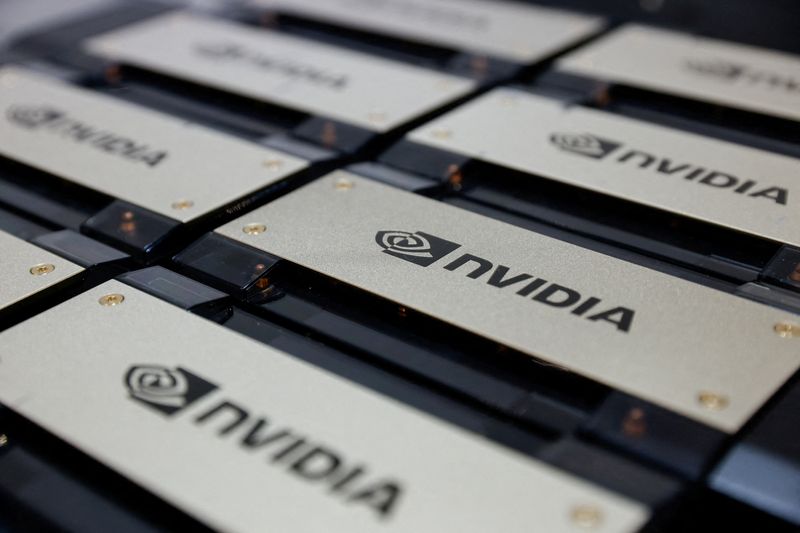Intel stock extends gains after report of possible U.S. government stake
SAN JOSE, Calif. - NVIDIA (NASDAQ: NVDA), a semiconductor giant with a market capitalization of $2.83 trillion and a perfect Piotroski Score of 9 according to InvestingPro, is setting up a research center in Boston to advance quantum computing, integrating it with AI supercomputers. The NVIDIA Accelerated Quantum Research Center (NVAQC) aims to tackle quantum computing’s most complex issues, such as qubit noise and the practical application of experimental quantum processors. The company’s strong financial position, with a current ratio of 4.44 and revenue growth of 114.2% in the last twelve months, provides solid backing for this ambitious initiative.
The center will collaborate with quantum computing pioneers like Quantinuum, Quantum Machines, and QuEra Computing. These partnerships, including engagements with academic researchers from Harvard and MIT, are expected to drive significant advancements in the field.
NVIDIA’s CEO, Jensen Huang, emphasized the potential of quantum computing to augment AI supercomputers and address critical global challenges, from healthcare to new materials. The NVAQC will focus on developing CUDA-quantum hybrid computing, which could lead to breakthroughs in creating practical, large-scale quantum supercomputers.
Commercial and academic partners will have access to NVIDIA’s GB200 NVL72 rack-scale systems, described as the most powerful hardware for quantum computing applications. These systems will facilitate simulations of quantum systems and help develop low-latency control algorithms essential for quantum error correction.
The center will also utilize NVIDIA’s CUDA-Q quantum development platform, which allows researchers to create new hybrid quantum algorithms and applications. Harvard’s Mikhail Lukin noted the significance of NVIDIA’s technologies in advancing quantum research and their potential to bring quantum computing closer to practical use.
William Oliver from MIT’s Engineering Quantum Systems group highlighted the benefits of merging NVIDIA’s accelerated computing platform with qubits to address core challenges like quantum error correction and hybrid application development.
The NVAQC is expected to commence operations later in the year. Further details about NVIDIA’s quantum initiatives will be discussed during Quantum Day at NVIDIA’s GTC event, which runs through March 21.
This information is based on a press release statement from NVIDIA (NASDAQ: NVDA), which did not provide specific financial details or a precise opening date for the NVAQC. With an impressive return on assets of 82.2% and a "GREAT" financial health score from InvestingPro, NVIDIA appears well-positioned to execute this strategic initiative. For deeper insights into NVIDIA’s financial metrics and growth potential, investors can access the comprehensive Pro Research Report, available exclusively to InvestingPro subscribers, covering over 1,400 top US stocks.
In other recent news, NVIDIA has unveiled its new enterprise AI infrastructure, the NVIDIA DGX SuperPOD, featuring Blackwell Ultra GPUs. This development aims to meet the increasing demand for advanced AI computing across various industries. The DGX SuperPOD includes the DGX GB300 and DGX B300 systems, which are designed to significantly enhance AI performance, with the GB300 system delivering up to 70 times more AI performance than previous models. Additionally, NVIDIA introduced the NVIDIA Mission Control software and the Instant AI Factory service to streamline AI infrastructure deployment.
NVIDIA has also announced a collaboration with GE HealthCare to advance autonomous imaging technologies, utilizing the NVIDIA Isaac platform for Healthcare. This partnership focuses on automating tasks such as patient positioning and image scanning. Furthermore, NVIDIA’s Blackwell platform has been integrated into CAE software, accelerating simulations by up to 50 times and benefiting industries like aerospace and automotive. Companies such as Ansys, Altair, and Siemens have adopted this technology to enhance their product development processes.
In another development, NVIDIA launched the AI Data Platform to enhance enterprise data platforms with AI capabilities. This initiative involves collaboration with major storage providers, aiming to improve AI reasoning workloads and provide near real-time data insights. Lastly, NVIDIA expanded its Omniverse platform to integrate with industrial software, promoting digitalization and physical AI across industries. Companies like Schaeffler and Hyundai Motor Group are adopting Omniverse Blueprints to optimize operations and develop AI factory digital twins.
This article was generated with the support of AI and reviewed by an editor. For more information see our T&C.
